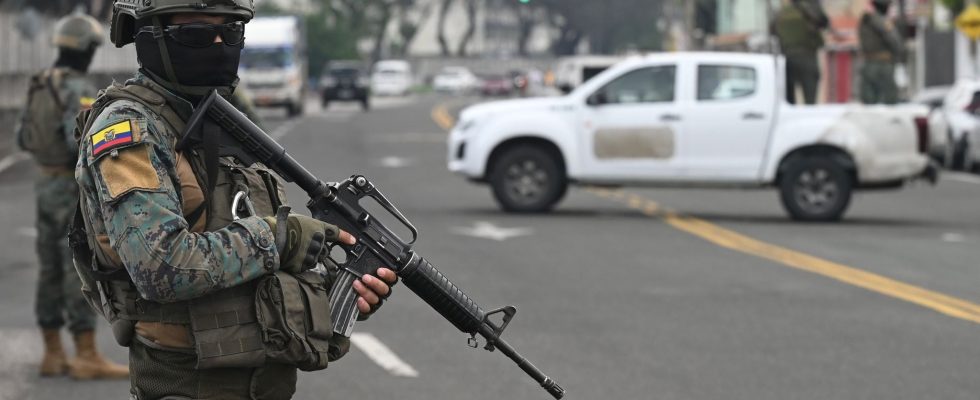Sitting in the small community bakery in the Las Malvinas neighborhood of Guayaquil, Sister Susana Veloz draws out her cell phone and shows a video. In images from a video surveillance camera, hooded men arrive amid the din of pistol and shotgun fire. They murdered four people who were chatting in front of a building, including an 11-year-old boy, before fleeing. “It happened in broad daylight, right in front of our premises in the Guasmo Sur sector,” she says, annoyed, behind her rectangular glasses. “We had to close temporarily.”
At the head of the Nueva Vida foundation, this nun helps disadvantaged young people in three working-class neighborhoods of Guayaquil, the third largest trading port in Latin America. She notes: “In a few years, violence exploded. When I arrived, twelve years ago, these neighborhoods were quiet. Today, we hear gunshots almost every day.” In 2023, the authorities counted 2,752 assassinations in Guayaquil, an increase of 63% in one year! Like its metropolis of 2.6 million inhabitants, Ecuador is descending into violence linked to drug trafficking. From a historically low homicide rate of 6.9 per 100,000 inhabitants in 2016, it increased to 45 per 100,000 in 2023. “It was the second safest country in Latin America in 2016; today Today, he is the most violent,” comments Renato Rivera, of the Ecuadorian Organized Crime Observatory.
On January 8, the small Andean country burst into flames after the escape of Adolfo Macías, alias “Fito”, leader of the powerful Choneros gang. Inspired by his Salvadoran counterpart, Nayib Bukele, the new president, Daniel Noboa, sent the armed forces to regain control of the prisons, which are command centers for drug trafficking. But the gangs stand up to the police. On January 9, in Guayaquil, armed men took employees of a television channel hostage live, while the cameras continued to roll. The incident ended with the intervention of the police, but other clashes broke out elsewhere in the city.
A logistics center for South American “narcos”
For Renato Rivera, Ecuador slipped into narcoviolence after 2016. That year, the Colombian FARC guerrillas, on the other side of the border, signed a historic peace agreement. More than 13,500 insurgents surrender. “New players then entered the game, notably the Mexican cartels and the Albanian mafia,” underlines Renato Rivera. These multinational criminals understood that Ecuador had many advantages: good port and road infrastructure, dollarized economy, weakness in the fight against drugs. The small Andean country is transforming into a logistics center for mafias from around the world. Because these crime holding companies have strengthened their links with local gangs, which they use as subcontractors, in order to better control the new export routes via Ecuador.
Supported by their extremely wealthy sponsors, the local “narcos” are recruiting in numbers. Pusillanimous, successive governments let it happen, preferring the relative calm of drug trafficking in peacetime to open war. Also, from 2008, the anti-American president Rafael Correa, encouraged by the late Hugo Chávez, leader of “revolutionary” Venezuela, decided not to renew the lease of the Manta air base, granted to Uncle Sam on the Pacific coast. There, 400 American soldiers were carrying out anti-drug operations. The following year, in 2009, they packed up. At the same time, public security policies are neglected. “There is a clear responsibility of the State, which has weakened the institutional framework for combating violence,” regrets university professor of social sciences Fernando Carrión.
President Noboa would like to remedy this mess. He wants to “neutralize” criminal groups and deploys soldiers across the country. On January 17, however, anti-mafia prosecutor César Suárez – who did not benefit from permanent protection… – was assassinated at the wheel of his white Mazda. Executed by gunfire in the center of Guayaquil, a week after the declaration of a state of emergency. Bad times.
